Definitions of home
Islander
by Mona Fertig
Salt Spring Island: Mother Tongue Publishing, 2024
$22.00 / 9781896949895
Reviewed by Cathy Ford
*
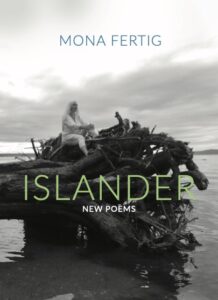
In this stunning collection of poems, linked poems and long poems are the media that examine the imagined life made true—true as in the cognizant measure, cohering to dreams, memories, childhood memorialized, adult life choices, the unwavering positivity of engagement with verdant daily life, transcendent.
Mona Fertig (The Unsettled) has returned to her writing desk—and a new vista—after many tireless years of setting aside her poetry writing energy to work as an editor and publisher to create an extraordinary panoply of Mother Tongue publications over thirty years that featured the art and literature of many B.C. poets, painters, photographers, critics, and cultural historians.
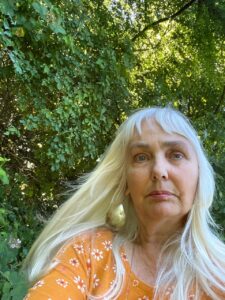
This book of new poems, Islander, is a celebration of Fertig’s distinctive, clarifying voice, her commitment to artistic expression, family, community, and her renewed excitement with her own writing. The carefully styled, smart constructs of the poems are richly woven together, in an intimate engaging narration of daily life in all its intensities.
To say this is a beautiful book is a sad understatement, especially when it’s compared to books often so carelessly published that they do not deserve the writing contained within them. In design, layout, colour, paper selection (including the care taken with the black and white photographs throughout), the attentiveness to cohesion of the book in the hand with the content is a marvellous meld of Fertig’s experience in presenting between covers the work of poetry to illuminate language and music, voice and metaphor, technique and surprise, joy and sorrow.
Islander is a tour de force. It links together the developing sensibilities of the writer and her command of vision, intent, and accomplishment. The command is especially apparent in the commonality of focus among the new poems selected and their relationship to the volume’s two long poems.
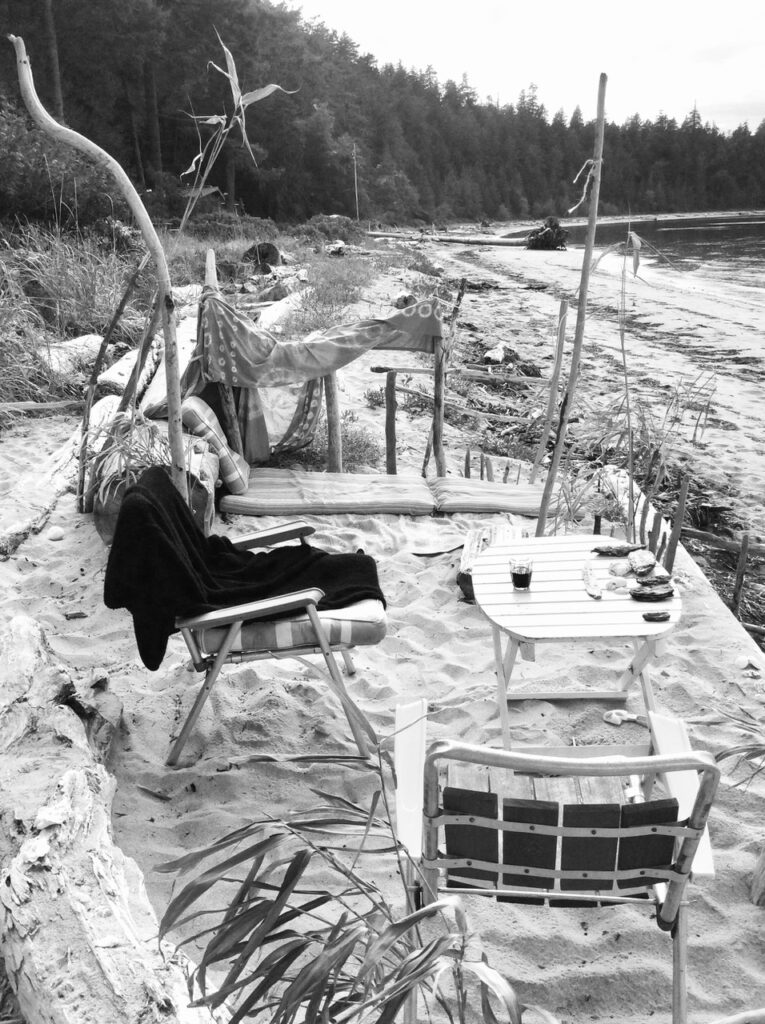
I am reminded of the wisdom from “Notes on the Language of the Contemporary Canadian Long Poem” (as presented at The Coast is Only A Line—SFU Conference and Festival, by Frank Davey on July 25, 1981, and published in chapbook form for the conference by Island Writing Series Publications). Davey may not have been the first, and certainly not the only critical voice to understand that the long poem is a particularly Canadian form, but he noted that the form is practiced predominantly among British Columbian poets. He remarked then, and it holds contemporaneously, like dead reckoning: “Even in a poem of place, time pours, a narrative moves…the poem ultimately becomes a narrative of this energy, the energy of a structure going through recognition, recurrence, and connection.”
The years fly by, and long poems like the ones in this book draw them a comet tail, at a speed and intensity it takes all afternoon and evening to fathom. Like those other spectral hieroglyphs, the northern lights, island heavens and island weathers touch every living surface, including the mind, the skin, dreamscapes, conversations, and politics that change by the hour.
In these lyric story-poems, in intense long poetics, consistent threads of unequivocal desire are married to the passionate everyday. These are fully realized observations, absolute and searing impressions of the profoundly joyful, as well as the unavoidably difficult.
The sensuality of colour and language makes this scattering of innocence-and-experience poems completely an islander book—at once isolated, looking in, and looking outward. Like a many-pebbled, deep-shadowed island beach, the vigorous trajectory of time, tide, and current make every rock a different shade, shape, and stimulant feeling. These pieces affirm a brighter consciousness, reflect a clearer eye. The flower, the tree, the garden, the sea: are all a deeper, more intoxicant, radiantly sensuous, green.
I was once told, “it takes all day to live a day in the country.” On an island that might be especially true. This life-affirming quip, shared by a friend years ago, has remained a byword through all my island seasons. I won’t mention the name of the friend who gave me this daily mantra to practice, as she too is an islander, and above all, values her private life and accomplishments there. As a true islander, one learns to sort the marvellous specificity of minutiae from the sharpened pencils and personal interactions of trivia.
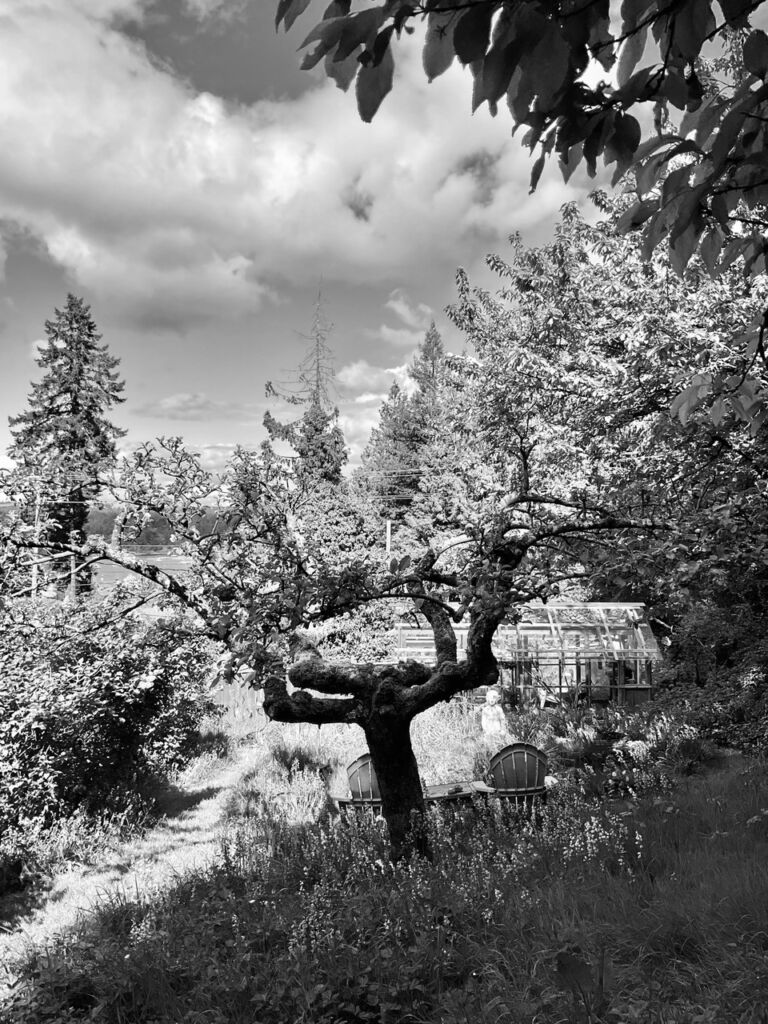
How one lives on an island is governed every day by the barometer and shifts in atmospheric pressure; by local microclimate and community turbulence. To individualize one’s ideas and artistic practice takes both isolation and engagement. To singularly learn discretion on an island takes years of studying the fine points of experience and interchange. In island engagement, the differences between the personal and the private are sometimes agonizingly, occasionally accidentally, exposed. The acknowledged state of affairs, according to the politics of the weather report.
And “life is what you make it” in the poems of Islander; the volume is marvellously attentive, completely so, and designed to make the reader reactive to these poems. No avoiding these persuasions, the precious minutes, contemplative hours, speed of light days, sweet spring rains, or long breathtaking sunsets. Fertig’s island is a place of incredible beauty, a place where one is privileged, yet hungry for peace, quiet. The colouration of the natural world here is denser, fog deeper, the cougars closer, storms darker, and the fresh sunshine more sharply brilliant.
From this purposeful, lifeforce work, the reader cannot disengage. This poetry touches you, knows your business immediately, challenges your practice, accepts foretelling symbol and apocryphal message, understands long-held perspectives, garners the remaking of on-going relationships, demanding lifework, and developing family history.
Acute as the wolf moon, as multi-hued as the talents of birds, the story-art telling and the poetic intent intensity of this collection provides an applied aesthetic life painting of islanding life. These enhanced truisms should be read in one sitting, perhaps under a flowering tree in the garden. Islander is an illustrative contemporary artwork, a handbook for the grateful, the engaged, the politik, the loving, the angry, and the forgiving, “both praise and a warning.”
Reflecting upon, discerning, but also sharing penetrating ghost memories of the city left behind, these ambitious poems do not waste a moment. The prescient awareness of choice, precious as photographs, electric as morning, focuses the mind. The inclination of those thankful chosen ones who would make their lives islanded, make art of life, beloved, who seek the realized life well-lived, deserving of inspiration, words well worth the most lucidly perceptive, radical celebrant living, should read this book of poems.
While no person is an island unto themselves, some books are. Islands uniquely live and breathe, like sentient creatures whose stories are told in some secret, nearly forgotten language that suddenly translates to the book’s page with startling clarity, that dreams every particular detail in the vibrant now. As fully encircled as an island is, perhaps a mere rock pile, or a pebble thrown by the fates into the ocean, in such isolation, the sea is also an embrace, water-bound, nature-kissed.
For those who choose island life, the scintillating attachment of island living to otherworldly reality takes clarity, concision, and celebratory effort to see farther, circumstantiated wisdom to understand the effect one’s work does have in the “outside” world. To speak one’s mind. To self-identify as an outlier. Accomplish one’s art. While caught in paradise, breathing fresh salt air. Islander will ripple out from its Salish Sea, southern Gulf Islands source, circularly patterned, facing down the impossible, as only one small but oh so important book of poems can.
Experience for yourself as a reader the undeniable contribution this writer has made to the literary culture and artistic communities of B.C. and Canada. Read the books she has already published, her own and others, chase down some small miracles. And breathe deep.
*
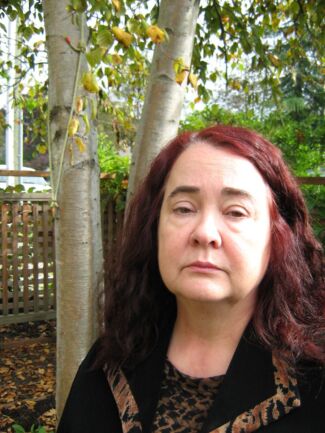
Cathy Ford is a poet, fictioniste, and memoirist working predominantly on the long poem, feminist issues, life and death concerns, social justice and peace, our relationship with this beloved earth. She has published more than fifteen books, including the art of breathing underwater (Mother Tongue, 2010), and Flowers We Will Never Know The Names Of (Mother Tongue, 2014) — an abc book of the language of flowers and their transliteration, an interpretation of grief and protest, based on the Montreal Massacre. Her earlier books are published by blewointment press, Caitlin Press, Harbour Publishing, and Véhicule Press. She lives in Sidney. [Editor’s note: Cathy Ford has reviewed books by Judith Copithorne, bill bissett, Jónína Kirton, and Linda Rogers for BCR.]
*
The British Columbia Review
Interim Editors, 2023-25: Trevor Marc Hughes (non-fiction), Brett Josef Grubisic (fiction and poetry) Publisher: Richard Mackie
Formerly The Ormsby Review, The British Columbia Review is an online book review and journal service for BC writers and readers. The Advisory Board consists of Jean Barman, Wade Davis, Robin Fisher, Barry Gough, Hugh Johnston, Kathy Mezei, Patricia Roy, Maria Tippett, and Graeme Wynn. Provincial Government Patron (since September 2018): Creative BC. Honorary Patron: Yosef Wosk. Scholarly Patron: SFU Graduate Liberal Studies.
“Only connect.” – E.M. Forster
2 comments on “Definitions of home”